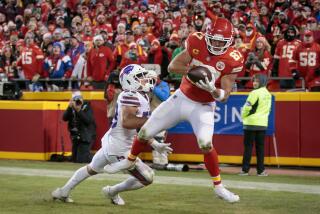Pro Football / Bob Oates : Might Use Instant Replay in the Playoffs, NFL Says
- Share via
The NFL’s experiment with instant replay officiating went so smoothly last month that the league may use its new machinery during the playoffs, including the Super Bowl.
Originally, the plan was to wait until next year before assisting game officials with electronic pictures.
Joe Rhein, the NFL’s director of administration, said from New York Tuesday that a summary of the research material gathered during eight exhibition games will be presented at a league meeting in October.
If approved by the owners at that time, he said, the system could be used as soon as the wild-card playoff games Dec. 29.
“The thing we learned in the preseason is that we can get the logistical things done,” Rhein said. “That is, it’s possible to review instant replays (in the press box) and get the word to the referee on the field without a significant loss of time.”
Art McNally, the NFL’s supervisor of officials, was in charge of the experiment, in which about 24 calls were reviewed last month--an average of three a game. The referee was overruled only once.
“The idea isn’t to overturn a bunch of calls,” Rhein said. “But if a big one clearly should be overturned, it would help the game to do it.”
The results of two other NFL experiments this summer weren’t so clear cut:
--Trying to counter a trend to longer games, the league had hoped to cut the time by six to nine minutes but succeeded only in gaining five. The average NFL game was played in 3 hours 9 minutes last year, and in 3:04 last month.
“The three-hour game is still possible this year,” NFL spokesman Joe Browne said. “Some people think they run a little longer in the preseason than the regular season.”
--The radio helmet experiment was more disappointing. Designed to minimize the adverse effects of crowd noise, the radios were supposed to be tested in several games. But in the end, they were operated by the pass offense players of only two teams in two games, with inconclusive findings.
The Raiders spent the first eight months of 1985 tailoring their roster in the aftermath of an 11-5 season that disappointed them last year.
And when they finished this week, the results were startling.
Since last season’s opener, the Raiders have changed the personnel in nine starting positions--6 of the 11 on offense and 3 on defense.
Against the New York Jets here Sunday, they will have two rookies in an opening-day lineup for the first time in 14 years: wide receiver Jessie Hester and linebacker Reggie McKenzie.
Other defensive promotions since Labor Day 1984: linebacker Brad Van Pelt and nose tackle Bill Pickel.
Others on offense: fullback Frank Hawkins, receiver Dokie Williams and three linemen, Mickey Marvin, Charley Hannah and, if he’s well, Shelby Jordan.
A third rookie starter, if Williams can’t make it, will be Tim Moffett.
When the Dallas Cowboys missed the playoffs last winter for the first time in years, one reason was the lack of strong receiving. They had lost Drew Pearson to retirement, they had traded Butch Johnson to Denver, and their young prospects had failed to improve.
In the draft last spring, the Cowboys, drafting 17th, thought they had Jerry Rice of Mississippi Valley. But at the last minute, San Francisco’s Bill Walsh traded up to 16th and took Rice himself, thereby providing the 49ers with a player who could start for the NFL champions as a rookie.
In Round 8, the Cowboys got one last chance, and connected. As the 216th player drafted this year they claimed Leon (Speedy) Gonzales from Bethune-Cookman in Daytona Beach, Fla. And from his first day at the Cowboys’ camp in Thousand Oaks, Gonzales looked every inch an NFL receiver, eventually catching several of the passes that helped Dallas to a 4-0 exhibition record.
Gonzales might not start Monday night when Dallas opens its season against the Washington Redskins, but he’ll play, Cowboy Coach Tom Landry said.
Which seems to prove a couple of things. There are still players to be found in the low rounds these days. And Dallas still finds some of them.
More to Read
Go beyond the scoreboard
Get the latest on L.A.'s teams in the daily Sports Report newsletter.
You may occasionally receive promotional content from the Los Angeles Times.










